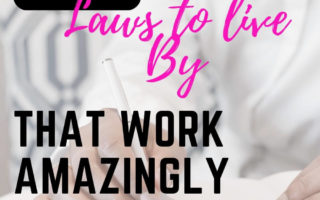Mental illness… We have all heard so many different things about mental illness. Many are clueless as to what it really means, while others have a false narrative about the stigmas attached to mental illness. Quite a few people just attest to say that everyone with a mental illness is crazy! So far from the truth, right?! There are plenty of professionals who are successful that openly share about their mental illness. Doctors, lawyers, celebrities, and more importantly everyday people just like you. Let me start by saying that there is not one size fits all remedy when it comes to mental illness. Many feel that when they receive their diagnosis, they don’t have a clue what to do or where to begin. I am going to outline a few things that I feel are important when trying to wrap your mind around your diagnosis and possible things to consider.
Your diagnosis is simply that, a diagnosis! Try not to get so lost in what you were diagnosed with. It only holds as much weight as you allow it to. Be realistic though, just because you got some news that you didn’t want to hear or wasn’t what you expected to hear ….. It doesn’t mean it’s just going to go away. Kind of like getting diagnosed with hypertension (high blood pressure ). You may or may not need medication, but you will definitely have to make some changes if you want to see some results as far as it decreasing.
Educate yourself! There are tons of resources out there about your diagnosis one of my favorite sites for education is the NAMI website. They go in great detail about mental illness and there is tons of information on their site. The more you know about your mental illness, the more you can begin to recognize your symptoms and identify some triggers. When it comes to mental illness, avoidance is not the answer, accept your diagnosis and find ways that you can manage it. Don’t let it manage you! Another quick note is that one diagnosis may slightly differ from one you may get from a different provider. Yes certain criteria needs to be met in order to be diagnosed but sometimes it can be slightly different from professional to professional. There’s nothing to be alarmed when this happens but be sure to include any pertinent information just in case you happen to switch providers.
To share or not to share….
Your diagnosis is your own personal business. You have the choice rather you feel that you want to share it. If you were to decide that you want to share your news with someone you trust, then one perk would be allowing them to become educated along with you. They may be able to be a part of your support system on those not so good days.
I have seen both sides of sharing. I have had some people say they wish they never shared that information because they immediately felt judged. I have had others say that it was the best decision of their life. See my post titled how to find a therapist.
Living with mental illness is not an easy task. In fact, it’s a very daunting one if you don’t seek some type of understanding and treatment. It can be daunting for the family of the individual, and the one suffering. There isn’t a clear solution and of how to “fix” it and that can be frustrating. So, lets back up I used the term “fix” in air quotes because many people with a mental illness say they are broken, of course, that is not true. You can take many steps to help yourself. It really does start with identifying the issue first. There are many simple things you can do that really help, like exercise, mediation, finding routines, education, self-care, identifying your triggers, psychotherapy, and support groups to name a few. You may go through a ton of coping skills before finding one that truly works for you. You may find yourself having several different coping skills and using them for different triggers.
NAMI suggest that you try ……
Radical acceptance
Deep breathing- (You can check out my deep breathing exercises below)
“ How to master deep breathing”
Opposite -to – Emotion Thinking
The 5 Senses
Mental Reframing
Emotion Awareness
Deep Breathing
Breathing is an annoying cliché at this point, but that’s because the best way to calm anxiety really is to breathe deeply. When battling my own anxiety, I turned to the concept of “5 3 7” breathing:
- Breathe in for 5 seconds
- Hold the breath for 3 seconds
- Breathe out for 7 seconds
This gentle repetition sends a message to the brain that everything is okay (or it will be soon). Before long, your heart will slow its pace and you will begin to relax—sometimes without even realizing it.
Opposite-to-Emotion Thinking
Opposite-to-emotion thinking is how it sounds: You act in the opposite way your emotions tell you to act. Say you’re feeling upset and you have the urge to isolate. Opposite-to-emotion tells you to go out and be around people—the opposite action of isolation. When you feel anxious, combat that with something calming like meditation. When you feel manic, turn to something that stabilizes you. This technique is probably one of the hardest to put into play, but if you can manage it, the results are incredible.
The 5 Senses
Another effective way to use your physical space to ground you through a crisis is by employing a technique called “The 5 Senses.” Instead of focusing on a specific object, with “The 5 Senses” you run through what each of your senses is experiencing in that moment. As an example, imagine a PTSD flashback comes on in the middle of class. Stop! Look around you. See the movement of a clock’s hands. Feel the chair beneath you. Listen to your teacher’s voice. Smell the faint aroma of the chalkboard. Chew a piece of gum.
Running through your senses will take only a few seconds and will help keep you present and focused on what is real, on what is happening right now.
Mental Reframing
Mental reframing involves taking an emotion or stressor and thinking of it in a different way. Take, for example, getting stuck in traffic. Sure, you could think to yourself, “Wow, my life is horrible. I’m going to be late because of this traffic. Why does this always happen to me?”
Or you can reframe that thought, which might look something like, “This traffic is bad, but I’ll still get to where I’m going. There’s nothing I can do about it, so I’ll just listen to music or an audiobook to pass the time.” Perfecting this technique can literally change your perspective in tough situations. But as you might imagine, this skill takes time and practice.
Emotion Awareness
If you live in denial of your emotions, it will take far longer to take care of them, because once we recognize what we’re feeling, we can tackle it or whatever is causing it. So, if you’re feeling anxious, let yourself be anxious for a couple of minutes—then meditate. If you’re feeling angry, let yourself be angry—then listen to some calming music. Be in touch with your emotions. Accept that you are feeling a certain way, let yourself feel that way and then take action to diminish unhealthy feelings.
You can’t control that you have mental illness, but you can control how you respond to your symptoms. This is not simple or easy (like everything else with mental illness), but learning, practicing and perfecting coping techniques can help you feel better emotionally, spiritually and physically. I’ve tried all the above techniques, and they have transformed the way I cope with my mental health struggles.
It takes strength and persistence to recover from mental illness—to keep fighting symptoms in the hopes of feeling better. Even if you feel weak or powerless against the battles you face every day, you are incredibly strong for living through them. Practical and simple methods can help you in your fight. Take these techniques into consideration, and there will be a clear change in the way you feel and live your life.
People are gaining more awareness and acceptance of mental illness. It is no longer a taboo to speak about. A great mind is a wise one!












Good post. I am facing many of these issues as well..
Keep working ,great job!